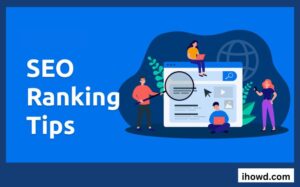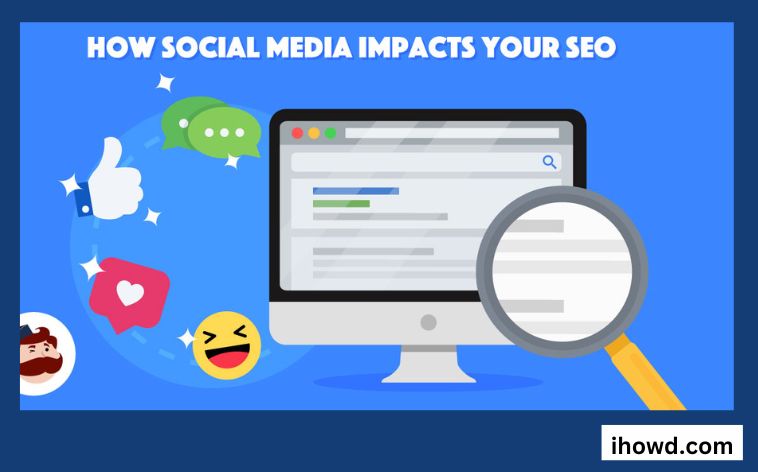How social media and SEO work: Social networking can enhance the SEO effectiveness of your website and improve your Google search ranking.
Too many marketers, however, continue to separate social media marketing from search engine optimization as separate ecosystems.
Social media marketing can and ought to be an effective SEO ally.
Here are five ways social media may help SEO and reasons why they should collaborate. You’ll gain knowledge about social media tactics to maximise its influence on your efforts in organic search.
Social media marketing is what?

As of 2019, social media had more over 3.4 billion users worldwide, making it one of the historical phenomena that has grown the fastest. There are many social media platforms that provide marketing opportunities for practically any business, regardless of size, industry, or target audience, ranging from well-established, widely used platforms like Facebook, Twitter, and Instagram video to those that appeal to more specific demographic groups or niche interests—such as TikTok, Snapchat, and Pinterest.
What is social media marketing, though, exactly? Social media marketing, in the words of marketing guru Neil Patel, is “the process of creating content that you have tailored to the context of each individual social media platform in order to drive user engagement and sharing.” This may include posting videos, sharing your most recent blog or business news, promoting special offers, answering questions or responding to comments, sharing eye-catching images, and taking other actions with the aim of engaging existing a social media audience. Regardless of the precise objectives of your company, sharing material that has been customised for your target audience and the platforms you are utilising is one of the keys to a successful social media marketing campaign.
What is SEO for social media?
In order to increase your website traffic, search engine visibility, and hopefully conversion rates, you can use social media SEO, also known as social SEO.
When it comes to small businesses, social media and SEO are typically handled by the same individual, assuming they have the time and minimal (if any) training. Larger SMBs frequently delegate the development and implementation of their social media and SEO strategies to other team members, departments, or even outside companies, treating them as separate marketing strategies.
But when it comes to achieving the objectives of a digital strategy, neither strategy should live in a vacuum and none can achieve everything.
Google does it consider social signals?
Social signals are online behaviours like likes and shares. Will your content’s ranking on Google therefore improve if it produces a lot of social signals? Well, over the years, Google has sent conflicting signals in this regard.
The dominant search engine began using social signals as a ranking component in 2010, prioritising quality over quantity. This means that in order to decide ranking, Google takes into account the author’s or creator’s reputation on social networking platforms.
However, Google made the decision to stop prioritising these social signals in 2014. As a result, likes and shares cannot be leveraged to improve your ranks from an SEO standpoint. But while social media is a crucial component of any digital marketing strategy, that doesn’t mean you should give up on your social media approach.
Ultimately, obtaining high-quality backlinks from reliable sites is what it takes to achieve a high search engine rating. Sharing your content on social media might also help it reach a wider audience.
How Do SEO And Social Media Work Together?

“Together” is the proper response to this query. You must see social media and SEO as partners in a comprehensive digital marketing plan. A strong social media presence helps your content get more exposure. Indirectly or perhaps directly, the engagement you generate might affect SEO.
Both search engine optimization and social media marketing place a strong emphasis on creating an engaging brand to draw in customers. Both of these approaches are natural and in demand among business owners.
High-quality content and a prominent brand presence are what social media platforms rely on most. You should put more of an emphasis on SEO tactics if you want to increase your social media reach. In addition, you must make sure that your site has a strong social media presence if you want to raise its search ranking.
Word of caution: It is very easy to overlook the importance of social media as mobile search affects SEO and you need to engage an SEO agency to stay competitive. Furthermore, your competitors can readily take full use of everything provided, making this a costly error.
The best tools available are always used by wise marketers. In this instance, this refers to their sophisticated and coordinated use of social media and SEO.
The impact of social media on your seo
The simple answer is yes, but not in the manner you may think. Social media does assist SEO. However, when it comes to social media, SEO specialists generally speak over one another. This is so because there are several kinds of connections between social media platforms and SEO. Each benefits SEO in a unique way.
1. Social Indicators
The relationship between social signals like Facebook “likes” and “shares” and Google Search Engine Result Pages (SERPs) rankings is the one that is most frequently debated. Correlational investigations have often demonstrated a close relationship between the two. Correlational studies, however, cannot prove that social signals were the reason for the improvement in ranks.
A blog’s visibility on a social media site can be improved through social signals. More and more people will have the opportunity to click on to the website as social signals increase.
Google claims that traffic is not a ranking criteria in and of itself. However, one of the most crucial ranking elements is backlinks from other websites. This is crucial since, in the absence of guest posting or other outreach link building strategies, the only way for your website to acquire backlinks is for a website owner or blogger to be aware that the content even exists.
The likelihood that one of these owners or bloggers may find your content and then start their own site with a hyperlink to you increases as traffic grows.
2. Facebook profiles
Have you noticed that social media accounts have started to show up as a result of some of your recent Google searches? This is due to the fact that Google scans social media sites the same way it crawls other websites, as Matt Cut points out in the video above.
As a result, there is a prospect for “SERP supremacy.”
Social media profiles offer the opportunity to rank for both your blog and your social profile, rather than taking up one spot on the first page of Google results with your blog. This increases the likelihood that a user will click over to a page relevant to your company.
3. social citations
Another point of debate concerns the significance of social backlinks for SEO. On the one hand, SEOs emphasise that social networking sites are indexed in the same way as other websites and that backlinks improve rankings.
Other SEOs draw attention to the fact that Google automatically classifies social media backlinks as “No Follow.” A website will not receive PageRank from links that have the “No Follow” tag. In response, it has been said that social backlinks might influence other ranking elements, like brand signals.
Additionally, social backlinks expand the channels via which people might reach your blog. As was already established, this raises the likelihood of obtaining links that do pass along “link juice” in the form of PageRank and other backlink-related elements.
4. Logo signals
A potential ranking factor known as “co-citation,” which occurs when the same brand is cited on two separate websites without a hyperlink between them, was first identified by Moz spokesman Rand Fishkin in 2012. Instead, a third website that doesn’t mention the brand is linked from the other websites.
Beyond co-citation, well-known businesses are given preference on SERPs. According to a study by Search Engine Journal, 70% of users select the website with the more recognisable, authoritative brand when a SERP offers similar results.
Social profiles aid in creating a brand identity and increase brand visibility online.
Fishkin even goes so far as to suggest that having social media profiles could be a ranking factor. No research, correlational or otherwise, are offered to support this, though.
Finishing up
Social networking has the potential to develop into a priceless tool over time, even though it frequently helps to increase your website’s organic ranking in Google! You will use social media to promote your organic search traffic and conversions, whether it is through content marketing, increased participation, more link-building, raised brand awareness, or reaping the benefits of Google’s partnership with Twitter.
Ihowd can provide more information.
